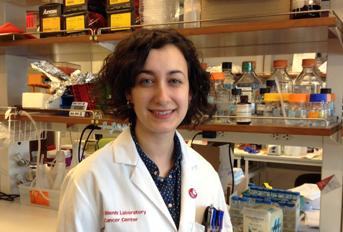Associação Portuguesa de Investigação em Cancro
Uma mutação no ADN mitocondrial que causa deficiência na fosforilação oxidativa mitocondrial modifica as propriedades das células tumorais
Uma mutação no ADN mitocondrial que causa deficiência na fosforilação oxidativa mitocondrial modifica as propriedades das células tumorais

Um grupo de investigação do Ipatimup descobriu que, quando uma célula tumoral tem deficiências na fosforilação oxidativa, as suas capacidades de se mover e migrar aumentam, assim como as suas capacidades de formar tumores e metástases em ratinhos. Estes efeitos parecem ser mediados por uma alteração na capacidade de adesão célula-matriz.
Este estudo, publicado na revista Human Molecular Genetics em dezembro de 2014, foi feito utilizando linhas celulares cíbridas, que são células híbridas que combinam o núcleo de uma célula com o citoplasma de outra. Neste caso, construímos uma linha celular cíbrida com uma mutação no ADN mitocondrial (que causa a fosforilação oxidativa deficiente) e comparámos o seu comportamento com uma linha celular cíbrida com ADN mitocondrial normal (com fosforilação oxidativa normal).
Este estudo lança novos conceitos para perceber quais são os mecanismos metabólicos que regulam as capacidades de motilidade e migração das células tumorais.
Autores e Afiliações:
Nunes JB1, Peixoto J2, Soares P1, Maximo V1, Carvalho S2, Pinho SS2, Vieira AF2, Paredes J1, Rego AC3, Ferreira IL4, Gomez-Lazaro M5, Sobrinho-Simoes M6, Singh KK7, Lima J8.
1Institute of Molecular Pathology and Immunology of the University of Porto (IPATIMUP), Porto, Portugal, Medical Faculty and.
2Institute of Molecular Pathology and Immunology of the University of Porto (IPATIMUP), Porto, Portugal.
3Center for Neuroscience and Cell Biology (CNC) and Faculty of Medicine, University of Coimbra-Pólo III, 3000-354 Coimbra, Portugal, Institute for Interdisciplinary Research (IIIUC), University of Coimbra, 3030-789 Coimbra, Portugal.
4Center for Neuroscience and Cell Biology (CNC) and Institute for Interdisciplinary Research (IIIUC), University of Coimbra, 3030-789 Coimbra, Portugal.
5b.IMAGE-Bioimaging Centre for Biomaterials and Regenerative Therapies, Institute of Biomedical Engineering (INEB), University of Porto, Porto, Portugal.
6Institute of Molecular Pathology and Immunology of the University of Porto (IPATIMUP), Porto, Portugal, Medical Faculty and Centro Hospitalar de S. João, Porto, Portugal.
7Department of Genetics, Department of Pathology and Department of Environmental Health, Center for Free Radical Biology, Center for Aging and UAB Comprehensive Cancer Center, University of Alabama at Birmingham, Birmingham, Alabama and Birmingham Veterans Affairs Medical Center, Birmingham, AL 35294, USA.
8Institute of Molecular Pathology and Immunology of the University of Porto (IPATIMUP), Porto, Portugal, Medical Faculty and.
Abstract:
Mitochondria are central organelles for cellular metabolism. In cancer cells, mitochondrial oxidative phosphorylation (OXPHOS) dysfunction has been shown to promote migration, invasion, metastization and apoptosis resistance. With the purpose of analysing the effects of OXPHOS dysfunction in cancer cells and the molecular players involved, we generated cybrid cell lines harbouring either wild-type (WT) or mutant mitochondrial DNA (mtDNA) [tRNAmut cybrids, which harbour the pathogenic A3243T mutation in the leucine transfer RNA gene (tRNAleu)]. tRNAmut cybrids exhibited lower oxygen consumption and higher glucose consumption and lactate production than WT cybrids. tRNAmut cybrids displayed increased motility and migration capacities, which were associated with altered integrin-β1 N-glycosylation, in particular with higher levels of β-1,6-N-acetylglucosamine (GlcNAc) branched N-glycans. This integrin-β1 N-glycosylation pattern was correlated with higher levels of membrane-bound integrin-β1 and also with increased binding to fibronectin. When cultured in vitro, tRNAmut cybrids presented lower growth rate than WT cybrids, however, when injected in nude mice, tRNAmut cybrids produced larger tumours and showed higher metastatic potential than WT cybrids. We conclude that mtDNA-driven OXPHOS dysfunction correlates with increased motility and migration capacities, through a mechanism that may involve the cross talk between cancer cell mitochondria and the extracellular matrix.
Revista: Human Molecular Genetics
Link: http://hmg.oxfordjournals.org/content/early/2015/01/23/hmg.ddu612.long




